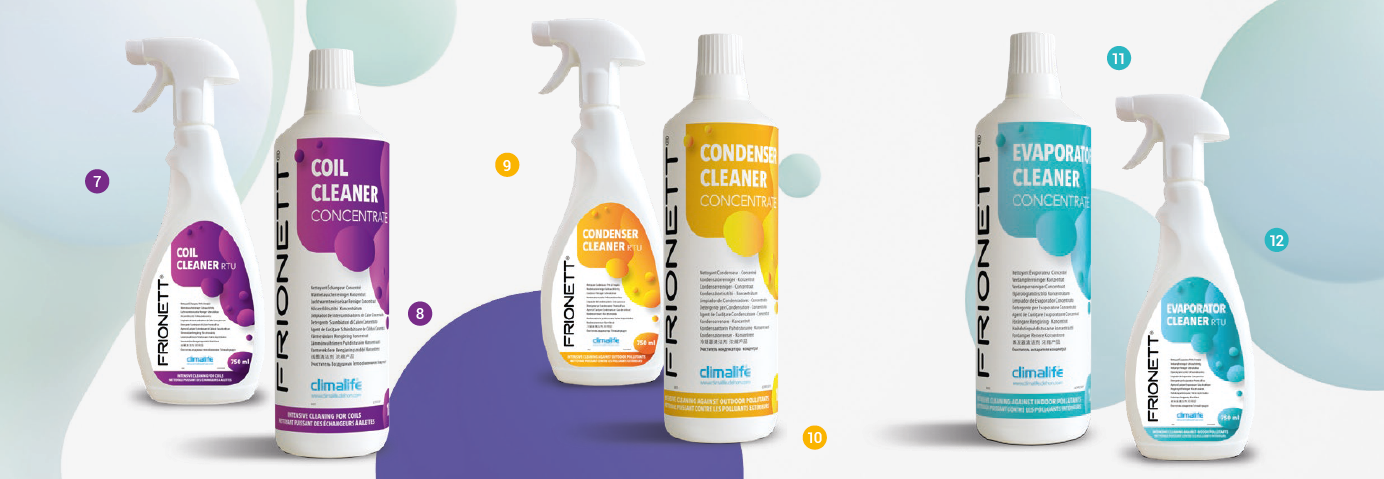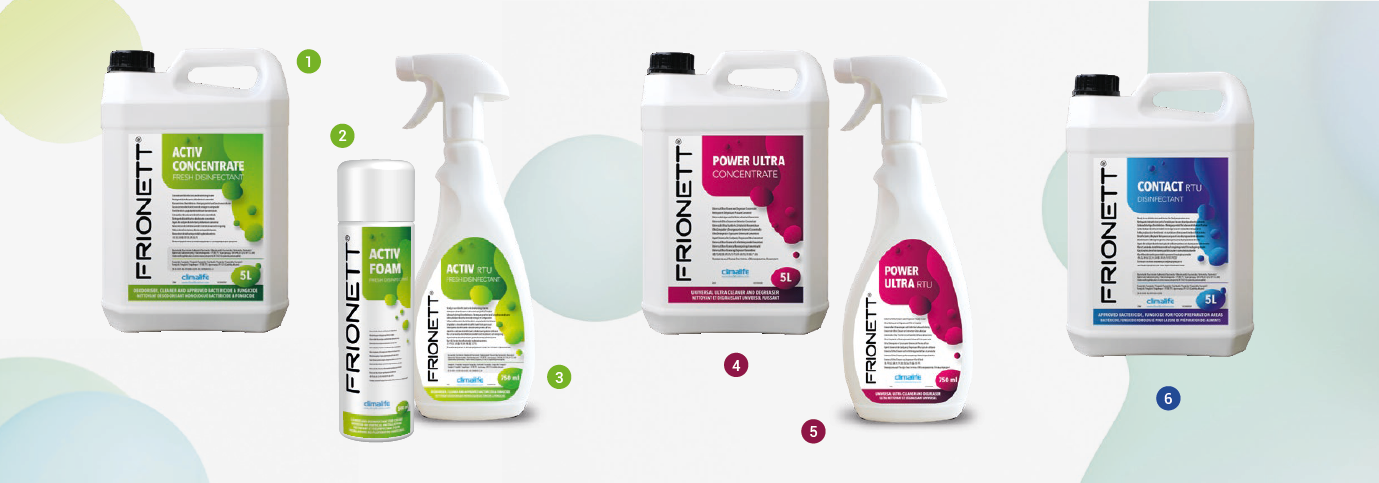This could be impacting our health, well-being and productivity.
A range of health risks such as indoor air pollution, damp, mould growth, inadequate indoor temperature could be associated with this type of living. To improve our levels of comfort and fresh air, more and more buildings are being equipped with heating, cooling and ventilation systems. HVAC-R systems that are designed to make our lives more comfortable and secure, consume electricity. With rising global temperatures, the global sales of building air- conditioning units are increasing and will continue to do so. This is likely to result in a threefold increase in electricity demand by 2050, so it is vital to maintain the performance standard of thermodynamic systems once installed in order to restrict further demands on energy usage.
Climalife is here to help the industry to reduce its carbon footprint. How ?
By offering products and technical support around :
-
- The regular maintenance and cleaning of HVAC-R systems.
-
- Application specific products.
-
- Reducing deterioration, ensuring the longer lifetime of installations.
Why Clean ?
Cleaning is important for maintaining the energy efficiency of HVAC-R systems, especially the heat transfer part of the system (evaporators and condensers). The appropriate cleaning process can eliminate unpleasant smells that can be emitted from the build-up of bacteria in these systems. It can also prevent the build-up of impurities on components.
What type of impurities can affect a HVAC-R system ?
The impurities are different on indoor and outdoor components. Evaporators are located inside a building and draw moisture from damp air in the dehumidification process. Dust, pollen and other contaminants are present in the air and stick to the evaporator fins, slowly building up over time. Condensers are located outside a building and are exposed to dirt, debris and other airborne pollutants such as pollen, plant seeds, smoke and pollution. During system operation, dirt builds up on the condensers and acts as a barrier, this can then reduce efficiency by stopping some of the heat rejection from the coil.
The optimal heat exchange of a water-cooled condenser can be affected by limescale and other impurities found in the water.
What are the cleaning solutions ?
An all-in-one solution is not ideal due to the differing types of system, system components and impurities that need to be cleaned. For example outdoor dirt and grime, indoor dust build up as well as grease and limescale all require different types of cleaner. Different applications also have different needs, for example industrial or commercial refrigeration, household or small facilities, as do the different system components, the evaporator, the condenser and other coils.
How to select the right Frionett® product ?
Climalife cleaning products can be selected based on different considerations:
-
- The type of debris/dirt: alkaline detergents and acids,
-
- The action required: cleaning and/or disinfecting,
-
- The application: area of indirect food contact or not,
-
- The location and size of system: concentrated or ready to use products.
The cleaning process
-
- To ensure greater penetration of cleaning product rinse the surface with water before beginning the cleaning process.
-
- Prepare the indicated mixture of concentrated product with water.
-
- Treat the surface with the ready mixed product.
-
- Leave it to work for the time indicated on the label.
-
- Rinse it off with water.
-
- If necessary, repeat the cleaning procedure one more time.
Climalife has developed the Frionett® Range
Frionett® products are easy to use and ensure very high efficiency during a very short action time in a safe and easy to use way.
The cleaning process
Inside a large office building there would be lots of evaporators to be cleaned. In this case we would suggest using ![]() Frionett® Activ 5L concentrated product, which should be diluted to 25% with water (in a ratio of one to four).
Frionett® Activ 5L concentrated product, which should be diluted to 25% with water (in a ratio of one to four).
The cleaning of an evaporator in a house wouldn’t need such a large quantity of cleaning product, so we would recommend using the ![]() Frionett® Evaporator Cleaner in the ready to use trigger spray, which would also help to degrease the evaporator. Alternatively, the
Frionett® Evaporator Cleaner in the ready to use trigger spray, which would also help to degrease the evaporator. Alternatively, the ![]() Frionett® Activ Ready to Use trigger spray or
Frionett® Activ Ready to Use trigger spray or ![]() Frionett® Activ Foam (for vertical surfaces) could be used to clean and disinfect the evaporator (check the local regulations on biocide usage).
Frionett® Activ Foam (for vertical surfaces) could be used to clean and disinfect the evaporator (check the local regulations on biocide usage).
In an outdoor air cooled industrial condenser which is exposed to airborne impurities, dirt and debris we recommend ![]() Frionett® Power Ultra in a concentrate version. The dilution should be done in a ratio of one part product to five parts water and the cleaning should be done from the bottom up. After a short processing time of around five minutes, the surface should be rinsed with water. This product is also ideal for degreasing surfaces such as fans, fins and coils where greasy impurities have formed a film.
Frionett® Power Ultra in a concentrate version. The dilution should be done in a ratio of one part product to five parts water and the cleaning should be done from the bottom up. After a short processing time of around five minutes, the surface should be rinsed with water. This product is also ideal for degreasing surfaces such as fans, fins and coils where greasy impurities have formed a film.
For cleaning a smaller condenser, we recommend using the ![]() Frionett® Condenser Cleaner concentrate which should be pre-mixed with water, or the ready to use trigger spray liquid version for a fast and effective treatment.
Frionett® Condenser Cleaner concentrate which should be pre-mixed with water, or the ready to use trigger spray liquid version for a fast and effective treatment.
![]() Frionett® Coil Cleaner, is appropriate for use on small to medium size coils (fan-coils, VRF / VRV air conditioning) and can help to provide an intensive clean and degrease on both evaporator and condenser coils. It is available in concentrate and a ready to use version.
Frionett® Coil Cleaner, is appropriate for use on small to medium size coils (fan-coils, VRF / VRV air conditioning) and can help to provide an intensive clean and degrease on both evaporator and condenser coils. It is available in concentrate and a ready to use version.
For cleaning, degreasing and disinfecting food processing areas ![]() Frionett® Contact can help. The five litre can contains a ready to use version which can be applied to surfaces that have indirect contact with food, such as cold rooms, refrigerator storage and commercial kitchens.
Frionett® Contact can help. The five litre can contains a ready to use version which can be applied to surfaces that have indirect contact with food, such as cold rooms, refrigerator storage and commercial kitchens.
The processing time can vary from 15 to 60 minutes depending on the intensity of dirt and if disinfection is required. The surfaces treated should be rinsed with clean fresh water after use.
Water cooled condensers can be affected by limescale. These types of impurity have to be cleaned with acid based cleaners. Climalife recommends Duonett® D7, the perfect product that is safe for both systems and engineers to use. Depending on the amount of limescale or incrusted dirt, the concentration can vary from 10% to 50% in volume.
The Results
As well as the visual benefit, regular maintenance and cleaning of air conditioning, heating or renewable equipment helps to optimise energy efficiency and performance which ensures longer equipment life. In addition, it can help prevent health risks, odours, obstructions, corrosion and microbial development.
We recommend that adequate cleaning is carried out every three to six months as part of a regular service and maintenance programme. Frequent cleaning of a system increases reliability and efficiency (less failures) and provides long-term protection and peace of mind for engineers and users.



